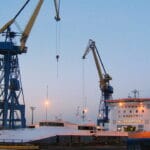
Le chantier naval Harland & Wolff de Belfast sauvé par une entreprise espagnole

Harland & Wolff, le chantier naval de Belfast, célèbre pour avoir construit le Titanic , a été racheté par le constructeur naval public espagnol Navantia dans le cadre d'un accord qui préserve environ 1 000 emplois au Royaume-Uni. Cette acquisition comprend les installations de Harland & Wolff à Belfast, Appledore en Angleterre et Methil et Arnish en Écosse.
Navantia est en pourparlers exclusifs de rachat depuis octobre , après la mise en redressement judiciaire de Harland & Wolff en septembre . Les conditions financières de l'acquisition n'ont pas été entièrement dévoilées, mais des rapports suggèrent que la valeur de la transaction s'élève à environ 70 millions de livres sterling.
L'accord garantit à Harland & Wolff le rôle de sous-traitant du programme de navires Fleet Solid Support (FSS), un contrat de 1,6 milliard de livres sterling pour la construction de trois navires de ravitaillement pour la Royal Navy . Navantia est le principal contractant de ce projet, dont la construction se déroule au Royaume-Uni et dans les installations de Navantia à Cadix, en Espagne.
Le secrétaire d’État au Commerce, Jonathan Reynolds, a qualifié l’accord de « bon pour l’emploi » et « bon pour la sécurité nationale ». Il a ajouté que les termes modifiés du contrat FSS étaient « relativement mineurs compte tenu de la taille de ce contrat » et essentiels pour assurer la livraison des trois navires.
« Cet accord est un vote de confiance majeur de la part de Navantia envers le Royaume-Uni », a déclaré Reynolds. « Il garantira notre capacité souveraine de construction navale, renforcera notre marine et assurera la croissance économique tout en stimulant les communautés côtières. »
Cette acquisition s'inscrit dans le cadre d'un effort plus vaste du gouvernement britannique visant à repenser ses relations avec l'UE après le Brexit et à explorer de nouvelles collaborations en matière de sécurité et de défense. Navantia, un important bénéficiaire de financements du Fonds européen de défense, est impliqué dans de nombreux projets dans le cadre de la coopération structurée permanente (Pesco) de l'UE.
La secrétaire d’État pour l’Irlande du Nord, Hilary Benn, a salué cette acquisition, estimant qu’elle assurerait un « brillant avenir » à Harland & Wolff, la qualifiant de « société emblématique, de renommée internationale, avec une longue et fière histoire ». Le chef du DUP, Gavin Robinson, a fait écho à ces sentiments, soulignant que l’accord « garantit des emplois pour des années, pas des mois » et offre une stabilité indispensable aux employés.
=1" alt="Visite du prince Charles au chantier naval Harland & Wolff de Belfast par David Cordner Photography" class="wp-image-86917">Le roi Charles a rendu visite à Harland & Wolff en 2021. Image reproduite avec l'aimable autorisation de David Cordner.
Navantia prévoit d'étendre le rôle de Harland & Wolff dans les secteurs britannique de la défense et de l'éolien offshore. Le constructeur naval espagnol a déclaré que cet achat renforcerait les capacités de construction navale du Royaume-Uni et créerait des emplois supplémentaires, en s'appuyant sur l'effectif actuel d'environ 1 000 salariés.
Les syndicats représentant les travailleurs des chantiers navals ont accueilli favorablement l’accord mais ont averti que le succès à long terme dépendrait de la régularité des charges de travail. Matt Roberts, responsable national de GMB, déclare : « Bien que les quatre chantiers restent ouverts, sans un rythme de travail soutenu, ces chantiers continueront à avoir des difficultés. »
Cette dernière acquisition met en lumière l'histoire récente tumultueuse de Harland & Wolff. La société avait été placée sous administration judiciaire en 2019 avant d'être rachetée par InfraStrata, une petite entreprise énergétique, rebaptisée Harland & Wolff Group Holdings. Des dettes élevées et une dépendance à l'égard de prêts à taux d'intérêt élevés ont entraîné de nouvelles difficultés financières, aboutissant à la suspension de la cotation des actions de la société plus tôt cette année.
L'opération devrait être finalisée dans les prochaines semaines, une fois les autorisations réglementaires obtenues. Navantia s'est montré optimiste quant à l'avenir des chantiers navals, avec l'intention d'utiliser cette acquisition pour renforcer sa position sur le marché mondial de la construction navale.
Le constructeur naval de Belfast Harland & Wolff sauvé par une entreprise espagnole est apparu en premier sur Marine Industry News .

